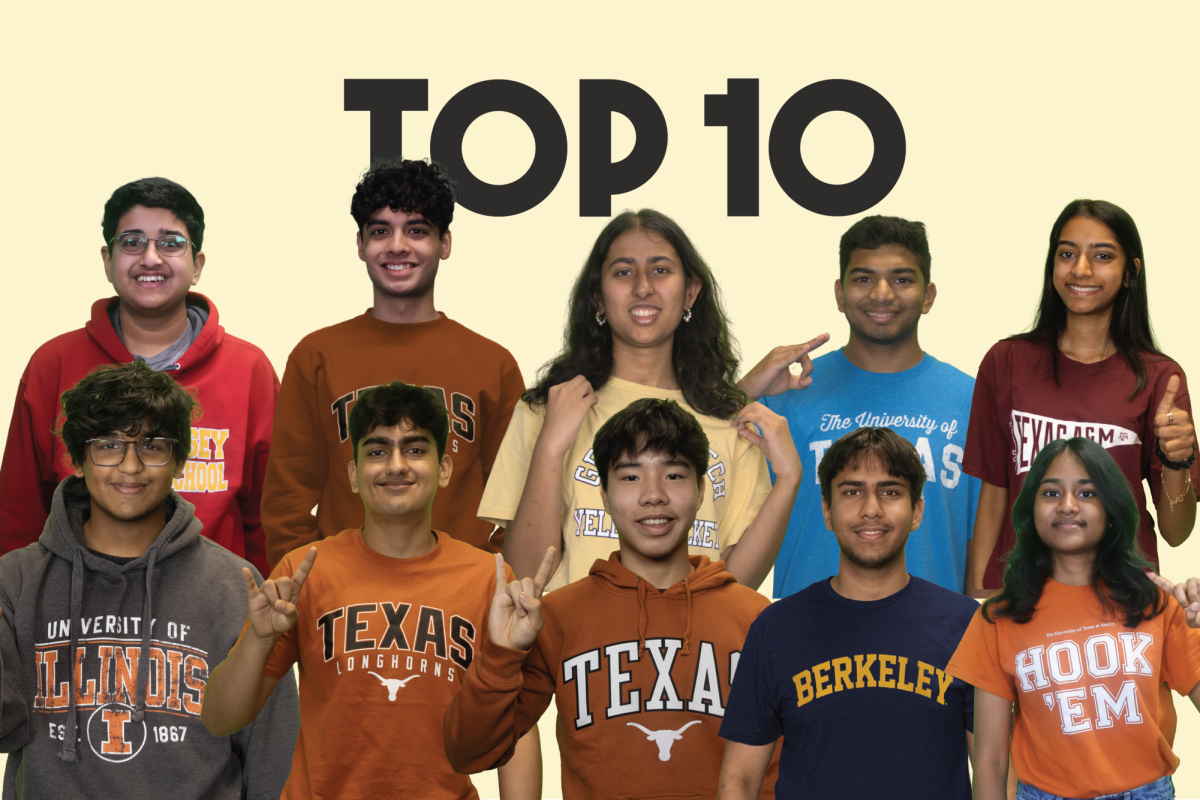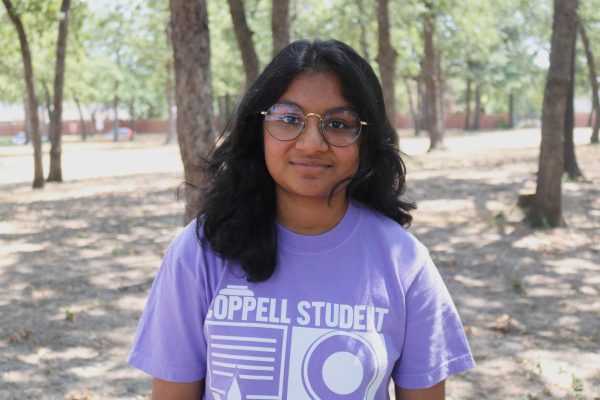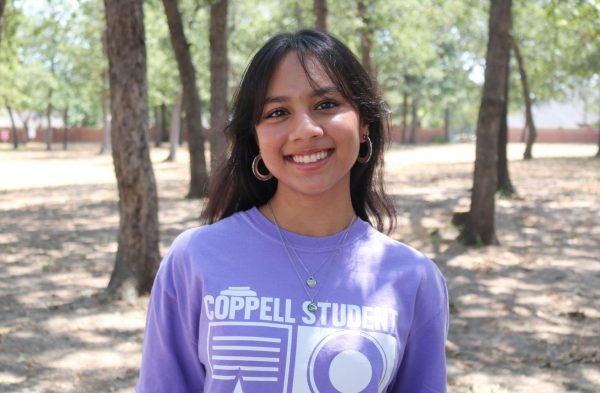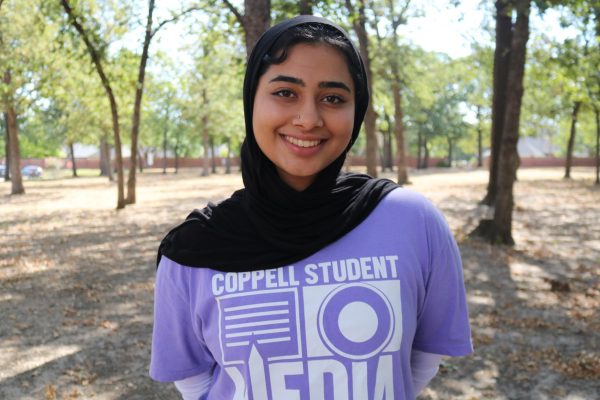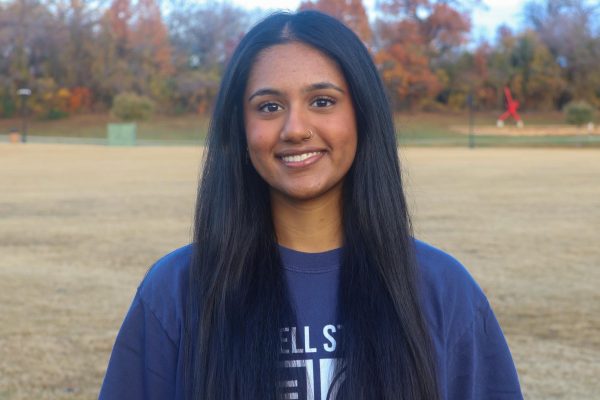The graduating class Top 10 was finalized based on their high school GPA. The Top 10 share their advice and thoughts on the high school experience.
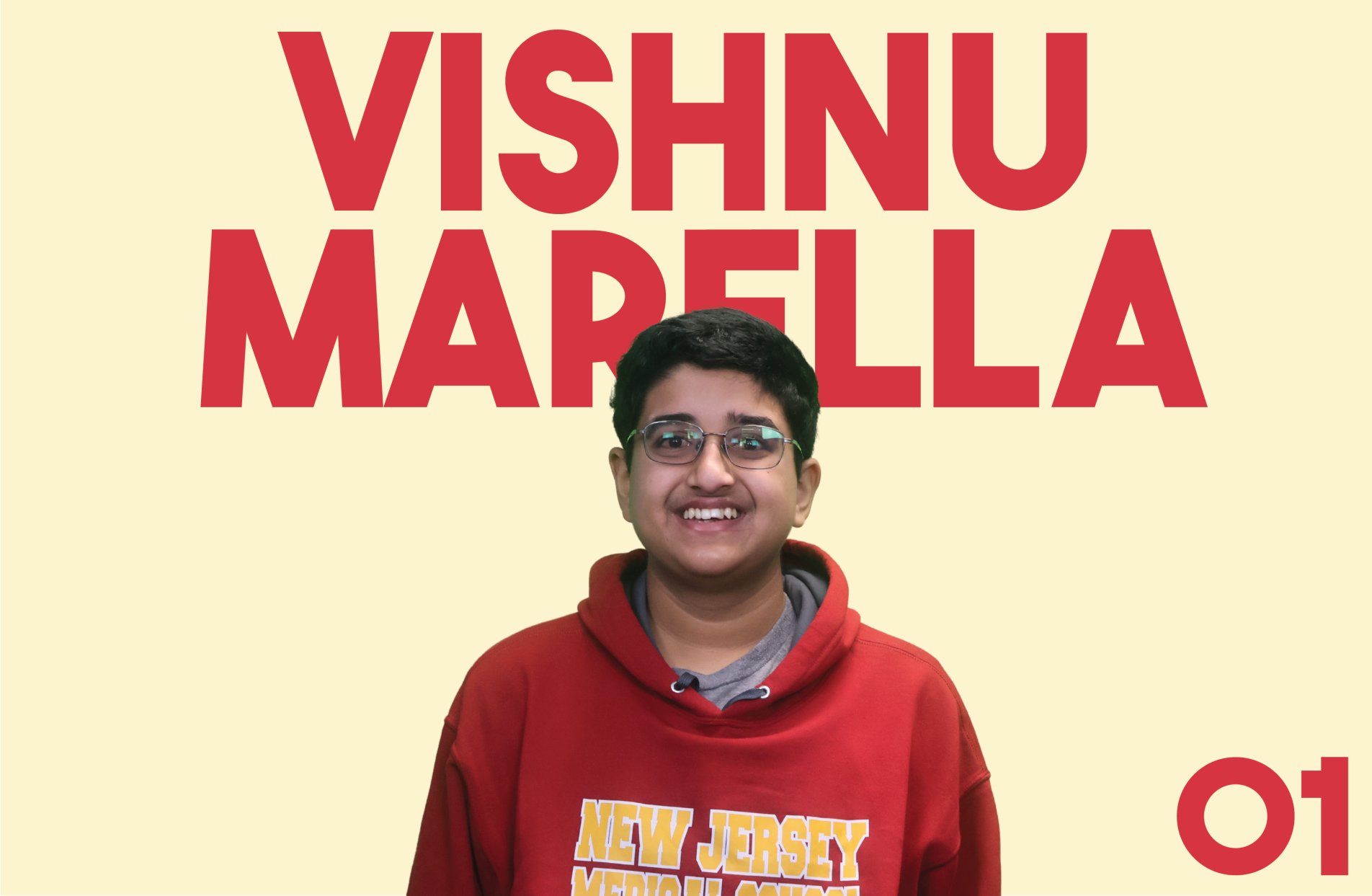
What does it mean to you to be in the top 10?
I won’t lie because being valedictorian is definitely a big honor and it was something that I was shooting towards. I was very happy when I got it. I did want to rank highly and I’m really happy that I did and that my work paid off, especially coming from a long line of success. It felt like a weight was lifted off my shoulders because I had a lot to live up to in terms of my sisters. My oldest sister, Pooja Marella, graduated as the valedictorian of the CHS class of 2016, and my second older sister, Priya Marella, ranked third in the CHS class of 2021. With all of us in the family aspiring to pursue a career in the medical field and with both of my sisters being academically successful in high school, there was a lot of pressure for me to do it, not from my parents or my siblings, but rather being self-imposed. So, I was excited when I got my rank and felt like I was living up to the legacy.
What advice would you give to your underclassmen?
I would say just take it one class at a time. It doesn’t really matter as much as you think it might in the moment of getting one bad grade. Just make sure you do the best in all of your classes, really enjoy what you’re learning and try to make sure you understand what you’re learning because that’s what I tried doing throughout my high school career. I truly did enjoy all the subjects I took, whether it was AP Calculus BC, AP U.S. History or AP Literature. I would just say don’t regret anything, whatever you’re doing, just do it with the purpose of looking 10 years from the future, and being happy with the choices you made. I’m happy with mine. I made the choices I made, and I’m really happy that that led to me getting into the college that I wanted and getting the valedictorian status. Everybody should know that you only have a certain amount of time in the day and it’s important for you to prioritize what you want and make sure that you have no regrets.
What is a high school memory that will always stay with you?
While it may be generic, I really enjoyed my AP Calculus BC class with Coppell High School math teacher Ian Vanderschee, specifically when we played spike ball because it was really fun. I took this class last year and enjoyed spending time with last year’s seniors before they graduated, and I also really liked the lunches I had with the people in that class as well. These were always a highlight of my day and it was really fun to spend time with my friends.
What is the unexpected lesson you’ve learned during your time in high school?
The most unexpected lesson I’ve learned is don’t expect things or don’t plan for things to go a certain way. I feel like in terms of what I wanted to do in my future, I had a whole plan in ninth grade and a lot of things didn’t end up going my way, which is OK, because looking back, it really doesn’t matter. Things are not always going to go your way and it’s important for you to understand that and to deal with it accordingly, especially in terms of applying to college. Things may not always go your way, but you’re going to end up in the right place for you. It’s important to persevere and keep sticking through it all.
What motivates you to excel academically, even in the face of challenges?
Mostly, what motivates me most is that I really do enjoy the subjects I take. I like everything I learn, which is what motivates me to study, do my homework and other extracurricular activities because I keep in mind the fact that I want to be a doctor. Just by thinking in my head, ‘If I study this, I’ll potentially save a patient in the future, and I’ll be a better doctor for future patients if I learn this correctly.’ So thinking in terms of the long term, it really helps me overcome these challenges when I am feeling down.
If you had the chance to redo high school, what would you change?
I don’t think I would change much, because one of my philosophies is doing everything you want to without having regrets. I honestly don’t regret anything because there’s nothing major enough for me to regret. Obviously, I have made a few minor mistakes that I wish I could fix, but all those mistakes eventually worked out in the end, so I don’t think I have any regrets or don’t think I would have changed anything.”
What’s one misconception people have about high-achieving students like yourself?
The biggest misconception other people have is that highly-ranked students just cheat which I don’t think is true. I’ve heard that a lot and as for myself, I can say that I never cheated but I think that’s a big misconception that people think about the students with consistently high grades. Another misconception that people have about me is that they thought I just study all day and night as soon as I go home, thinking that I didn’t have a life outside of school. This wasn’t true because I did everything I wanted to do, meaning I spent a lot of time with my family and always had fun with my friends. The common misconception if you have a high rank is that you just have to devote your whole life to studying. However, you don’t have to do that because you just have to do your best in your classes and things will fall into place. If you are on top of your subjects, then most likely, you won’t be in a position where you have to miss out on a social event happening on the weekend.
What’s your secret to success?
It is just working hard, studying when you have to and not procrastinating. That allowed me to keep up my grades while also working on my extracurriculars and spend time with friends and family.
I also have a lot of people supporting me, including my parents, teachers and especially my older sisters because both have already gone through this whole process. It’s not just me doing all the hard work; it is everyone around me wanting the best for me who have all helped me out a lot. I wouldn’t say there was like a secret formula or anything like that. I worked hard and that’s just what happened.
Have you ever had to deal with imposter syndrome and what do you do to overcome self doubt?
There are times when I’m in shock at a high grade I received after not expecting it, specifically, I remember getting a really good grade on an AP physics test and was shocked as to how I got it. I think I’ve learned to deal with imposter syndrome over time because if you keep on doing what you’re doing and you know that you did it the right way, that’s what matters. Ultimately, you’ll end up in the right place for you so all things will work out.
How has your high school experience shaped your future aspirations and goals?
My time in high school made me want to become a doctor in the future even more, especially while taking AP Biology and AP Chemistry as these science classes helped me solidify my interest in biology. I realized more how I wanted to go into medicine because I like problem-solving, and spending time with my oldest sister who is currently a doctor helped me realize how much of an impact she has made on her patients. I was confident about this career choice so I applied to only BS/MD programs in the fall of 2023 and have now committed to the seven-year accelerated BS/MD program at Rutgers and New Jersey Medical School, where my sister, Priya, is currently studying as well.
Who is someone, a teacher or mentor, who you’d like to thank for their impact on your academic journey?
I would definitely like to thank Mr. VanderSchee because he is a really great teacher and always helped me out whenever I was confused. I would also like to thank Priya and Pooja, my sisters. They always provided me with a lot of advice and I’m grateful for that. I am extremely thankful to my parents because they’ve always supported me through everything and have made the biggest impact on my academic journey. They never put any pressure on me to become valedictorian and were always very supportive in whatever I was doing. They were always there behind me and understood what I was going through. I always had a lot of fun with my friends and they were also a nice support system.
How did Boy Scouts allow you to explore your interests?
I enjoyed the Boy Scouts experience in sixth grade and it expanded my horizons. It also encouraged me to go on camping trips and I realized I liked camping. It’s a whole other thing whenever you have leadership inside the areas of society, where everybody’s there. Wherever you go camping, it becomes different because it’s hard being a leader that keeps track of some of those 12-20 boys who just wanna have fun. I learned the importance of listening and communication skills and how that ties into being a leader, whether it was at campouts or for my Eagle Scout project.
How did Teen Court allow you to explore your interests?
In Teen Court, I was an attorney. When real teenagers committed real crimes, it was my job to either defend them or prosecute them, depending on what side I chose for the day. I found a lot of kids who committed crimes had awful backstories, and I just felt bad for those kids who were dealing with some horrible circumstances. So Teen Court opened my eyes to a lot of what was going on in the world, which Coppell is very sheltered from. Teen Court allowed me to see some of the other things I wasn’t exposed to like people who were driving without a driver’s license, possessing marijuana and mostly minor offenses. But sometimes it was a really big thing and it was eye-opening.
What are some traits that you have gained through these experiences?
Leadership is one of the things and also communication skills, which are important for a doctor in the future. On top of that, just general critical thinking skills, especially in Teen Court, it’s important to understand the case before you argue for or against it.
Why did you decide to pursue this career?
I liked the critical thinking aspect and the humanitarian aspect. I enjoy the critical thinking aspect of computer science. I liked the interpersonal relations that being an attorney had. So I felt that medicine was kind of a bridge of both of those things that I was looking into.
Where do you see yourself in 10 years?
Hopefully, I’ll be in residency and with my MD. Hopefully, I won’t have changed too much, and I remain with a positive outlook on life. Long term, I’ll be a practicing physician.
Story by Rhea Choudhary and Aliza Abidi
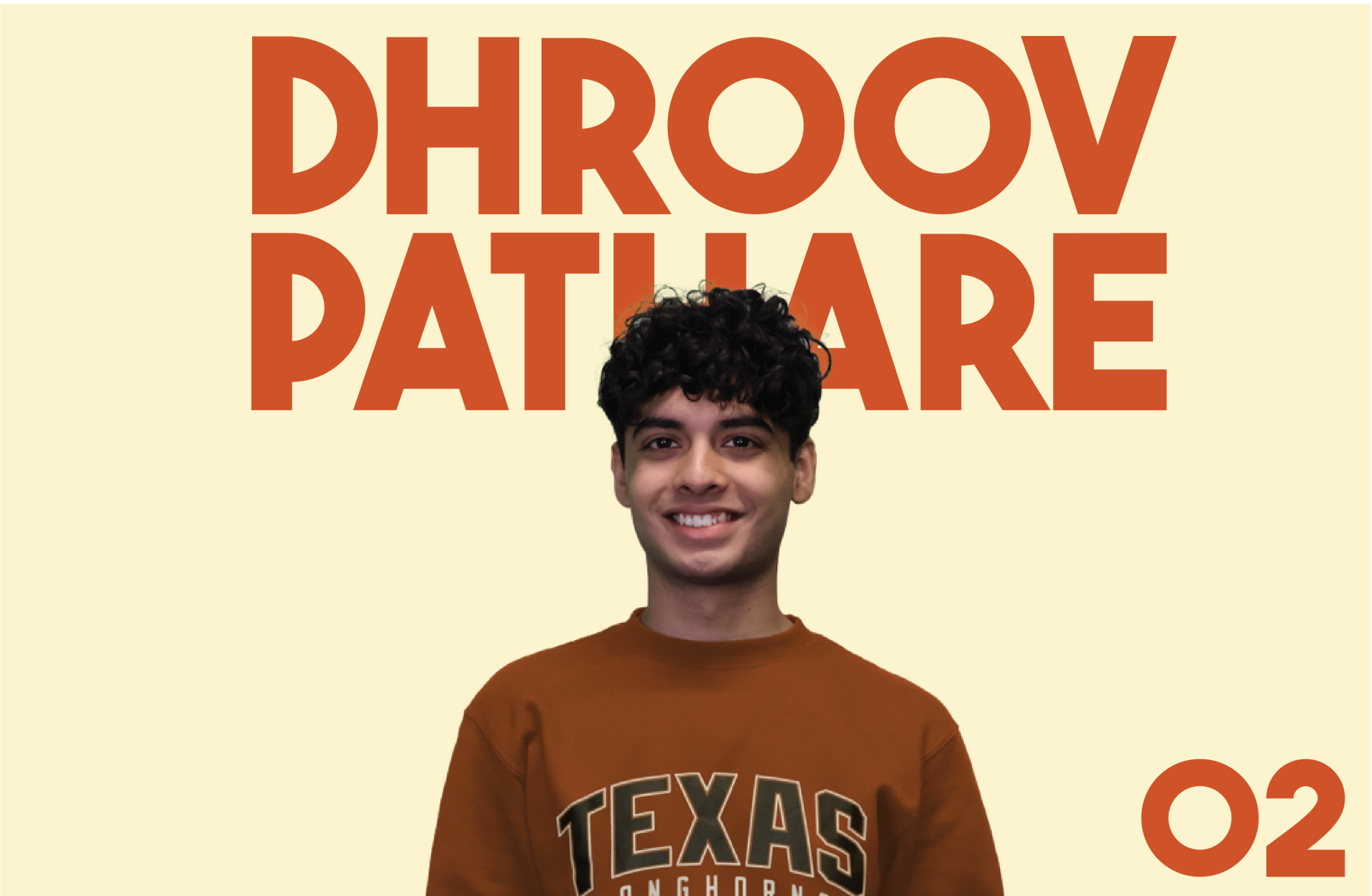
Coppell High School senior Dhroov Pathare epitomizes the essence of academic excellence and personal growth during his high school journey as the class of 2024’s salutatorian, ranked second in his grade. Pathare’s pursuit of knowledge, along with a genuine passion for learning, has placed him among the top ranks of his graduating class. Beyond his academic achievements, Pathare has actively participated in various extracurricular activities, gaining valuable research experience and leadership qualities. Pathare hopes to be an oncologist in the future, following his childhood love for science and will study neuroscience at the University of Texas at Austin as a Dedman Distinguished Scholar with a full undergraduate degree scholarship. Pathare’s dedication is displayed through what he believes is the path to succeeding and obtaining each academic or personal goal you set for yourself while maintaining a balanced lifestyle.
What does it mean to you to be in the top 10?
Being ranked in the top 10 students is very rewarding and it’s really an incredible honor because it reflects all my hard work. It reflects the dedication and passion that I put into my academics and my extracurricular activities throughout high school. And to me, it’s more than just a ranking. It really represents the support that not only my teachers have given me, but also my family and friends, motivating me to continue to set high goals and achieve them through college and beyond. It reminds me that success comes with a lot of responsibility to not just help others but also inspire others.
What advice would you give to your underclassmen?
The biggest piece of advice I would give my underclassmen is to embrace all those opportunities that come your way in high school – don’t ever be afraid to step outside your comfort zone. High school is the time to explore and grow as a person, so taking advantage of the available opportunities is very important, whether it’s by joining clubs, participating in sports, doing art or even volunteering in the community, it would really help you discover your new passions and build valuable skills. I also think something that’s very important is to maintain a balance. It’s important to work hard because everyone’s time in high school is limited, yet it’s equally important to take care of your health, which means hanging out or pursuing your hobbies. Setting realistic goals, managing your time wisely and making sure that you have fun along the way are how you will see the most success in your personal and academic growth.
What is a high school memory that will always stay with you?
For me, it’s all those state and national competitions that I’ve had the opportunity to be a part of and travel through the Technology Student Association Club (TSA), Junior State of America (JSA) Club and even the Texas Science and Engineering Fair. These gave me the chance to travel with some of my best friends and I got to explore new cities. I got to meet people from different schools and each competition was a great opportunity for me to create memories with some people I never even thought I’d meet. A big part of what made these trips unforgettable was how exciting it felt to be in a new place with students with unique interests.
What is the unexpected lesson you’ve learned during your time in high school?
Something that has stuck with me is that failure is not bad. It’s not the opposite of success; instead, it is a big part of it. Since middle school, I really struggled with a sense of perfectionism. I always wanted to get 100% on everything possible, and I wanted to be perfect in everything I did. This made any small challenge or setback I experienced a very big blow to me and my mentality. However, over time I realized that every mistake is an opportunity to not only learn but also grow. This shift in my mindset wasn’t easy, but it really helped me in the next four years of my life. It taught me to be resilient in high school, giving me the courage to tackle these new challenges that I faced daily in school. I have now realized how important it is to understand that perfection is not the goal and that continuous improvement is a better goal to strive for in the long run.
What motivates you to excel academically, even in the face of challenges?
My motivation stems from my own personal ambition, but I also really desire to make a positive impact in my life. I’ve always been passionate about learning and pushing myself past my boundaries, but beyond that, I wanted all my efforts to mean something beyond just getting good grades. Whether it was through leadership or community service, I was really motivated by the idea of contributing to something larger than myself.
If you had the chance to redo high school, what would you change?
The biggest change I would make is not being afraid to step out of my comfort zone and try new things. I now realize that high school is the perfect time to explore all these different interests and discover what I truly love doing. For instance, throughout high school, I didn’t have as many opportunities to work on my athletic side or to participate in that many sports. I also left the band program at a very early age and previously partaking in those fun activities was really influential to my well-being in middle school and even in my freshman year. Then, after stopping those activities, I felt a void, feeling like something was missing. If I had the chance, I would tell my freshman self to continue pursuing those activities even through the challenges, because it’s very important to stick through what you love.
What’s one misconception people have about high-achieving students like yourself?
A lot of other students think that all the highly ranked students do is come home, study and just do their homework constantly. Honestly, we really keep a balance as well. While the amount you study depends on how much homework you have on a certain day or what tests you have coming up, but I think we all have good prioritization skills. I especially try to maintain a balance between studying and enjoying myself in my free time.
What’s your secret to success?
When trying to keep a balanced lifestyle, there are a lot of things I try to focus on. I like to stay true to my values, prioritizing time management, which allows me to balance not only my academics but also my extracurricular activities and time to spend with my family and friends. I have learned success is not just about hard work, but it’s also about smart work. It means setting goals, staying organized and something that many people also overlook is how essential it is to build strong relationships with your peers and teachers, as they are the ones most likely by your side. They’re the ones who support me and give me perspectives that really allow me to grow, which I’m very thankful for. I also like to stay curious and find ways in which I can learn something new. This helps me have the most motivation, which is really important to achieve long-term success.
Have you ever had to deal with imposter syndrome and what do you do to overcome self doubt?
A big part of success is pushing yourself to a boundary to reach your maximum potential; you have to realize that nobody is perfect, especially since you are not perfect in every way. If you understand that, that will be the biggest key to your growth personally and professionally. Throughout high school, there were many cases where I would not score as high as I’d wished for, but instead of it being a challenge or a setback, I think that imposter syndrome really motivated me to push myself further. Then, for an upcoming test after that, I would study harder and would continue to keep my grades up, along with trying my best to stay involved in the community wherever I could. In some cases, imposter syndrome can really be used as a driving force for success.
How has your high school experience shaped your future aspirations and goals?
High school helped me explore all of my interests and my passions – I was able to gain a multidisciplinary view of the world. I grew this desire for oncology and solidified my passion to be an oncologist in the future. Ever since I was young, I really loved science but during these past four years, I was able to pursue STEM-based internships and shadowed doctors within Dallas. Now when I think about my future, I realize how much I want to provide my future cancer patients with the compassionate care that they deserve, especially because I think that goes beyond scientific treatments and diagnosis. In the future, I will be studying neuroscience at the University of Texas at Austin with a full-ride scholarship for the time I am earning my undergraduate degree as a Dedman Distinguished Scholar, but I’ve also gotten into Harvard University, Stanford University and the eight-year accelerated BS/MD program at Baylor University.
Who is someone, a teacher or mentor, who you’d like to thank for their impact on your academic journey?
I really want to thank Coppell High School science teacher Susan Sheppard. I began loving chemistry even more by the way she organized her classroom and taught lessons. Each class was always very engaging, fun and intellectually challenging, especially as a part of the International Baccalaureate (IB) program. It was a huge shift from sophomore to junior year when I was in her IB Chemistry class in terms of how learning was conducted, but I ended up really enjoying the IB style of learning. In fact, I want to thank all my IB teachers, because they all have cared for me so much in the last two years. All of them have given me everything I needed to learn to grow as a person, and I value them as educators because the way they teach allowed me to learn more than I could in any other advanced placement setting.
Story by Rhea Choudhary
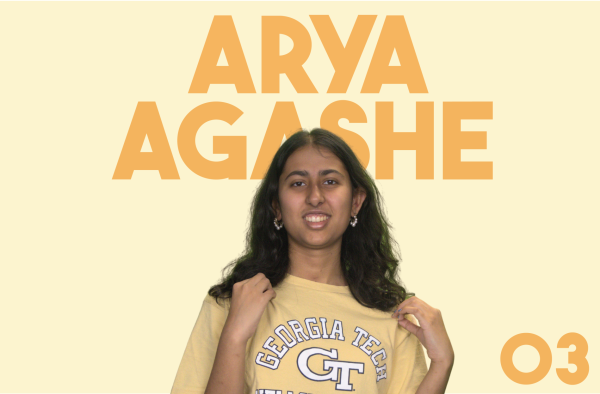
Coppell High School senior Arya Agashe is ranked third in her class, symbolizing her effort and dedication. She has committed herself to academics along with dance and TSA as the club’s historian. Agashe will be attending Georgia Tech University to pursue electrical engineering.
What does it mean to be in the top 10 for you?
It is all of the hard work that I’ve put in over the past four years, and it’s a representation of what I’ve done. It’s also everything that I’ve been able to learn in all the classes that I really enjoy.
What advice would you give to your underclass classman?
I think that it’s really important to take whichever classes that you enjoy. I get that rank is important to everybody, and GPA is important, but I feel like you should challenge yourself. I always tried to take classes that I thought I’d have fun with, and I feel like if you do that, then you’ll naturally try harder in those classes and want to learn more.
What is the high school memory that will always stay with you?
I feel like a lot of my high school memories came from the clubs that I’m involved with. All the traveling that we did through both DECA and TSA, such as TSA Nationals in Kentucky, was a lot of fun last year. Just being with my friends over there and spending time at all those competitions while also participating in the actual competition was definitely my favorite part of high school.
What is the most unexpected lesson you’ve learned during your time in high school?
Like learning, it’s important to both take some time to relax and do things that you’d like in addition to just focusing on classes. Sometimes it’s OK to be not doing anything or to just go take a walk or to read a book and do something that you actually love instead of just trying to think of, ‘Oh how is this going to help me in the future?,’ just to live in the moment.
What motivates you to excel academically, even in the face of challenges?
I’m mostly driven by the curiosity that I have to learn new concepts, especially new science topics or math topics, since science and math are kind of interconnected with each other. That’s inspiring to me because it shows me how the world works, so even if I’m challenged by something or if I’m going through a difficult time, it will be like, ‘Hey, at least I’m learning something new.’
If you had a chance to redo high school, what would you change?
I feel like there were a couple of classes that I wanted to take that I wasn’t able to take.There’s not too much, I liked how high school was.
What is one misconception people have about high achieving students like yourself?
One common misconception would be that everyone is just focused on academics by itself. I think that a lot of high-achieving students are also really focused on different things. I have so many friends who are really highly achieving, and have so many different talents and hobbies that they pursue in addition to academics. There’s always a variety of interests that everybody has.
What is your secret to success?
I say working consistently and not leaving things to the last minute. I struggle with that sometimes but I try to keep a good schedule and then I also just make sure that I take classes that I actually enjoy, so that I feel motivated to actually try to learn the content.
Have you ever had to deal with imposter syndrome and what do you do to overcome self doubt?
I don’t know how much I’ve really dealt with that, but I like to think that it’s not about the competition or comparison. Even though there are things like rank, there’s also just being interested in what you’re actually doing and knowing that my goal is to learn not to necessarily be better than everybody else, and knowing that helps with that feeling and negativity.
How has your high school experience shaped your future aspirations and goals?
I feel like a lot of the competitions and clubs that I’ve been involved in have kind of shaped where I want to go, so being involved with TSA has kind of shown me that I am interested in engineering and also the classes that I’ve taken like my physics classes and calculus classes helped. Then of course, things that I do out of school, like robotics have all shown me that I want to go into it. Now I know I want to go into electrical engineering, and I’m interested in learning more about AI and circuits. There’s also a lot of scope in areas like robotics and automation, so I want to learn more about that in the future. Then the other hobbies that I pursue, like singing, I know that I want to pursue in the future because I’ve done it for so long through high school, that it has just become an important part of my life that I want to carry forward.
Who is someone, a teacher or a mentor or some like anyone who do you think, who do you, who do you like to thank for their impact on your academic journey?
I definitely say both of my parents have had a major impact on how I think. I remember, specifically my dad, when it comes to academics, he always said things like ‘Just learn to learn or do it for the enjoyment of it,’ and I feel like that has always stuck with me. He always told me to make numbers my friends, and this is when I was a little kid and I’d be struggling with little math concepts and then he’d say ‘Don’t think of it as a challenge, think of it as something you’re doing for fun.’
Story by Greeshma Marathu
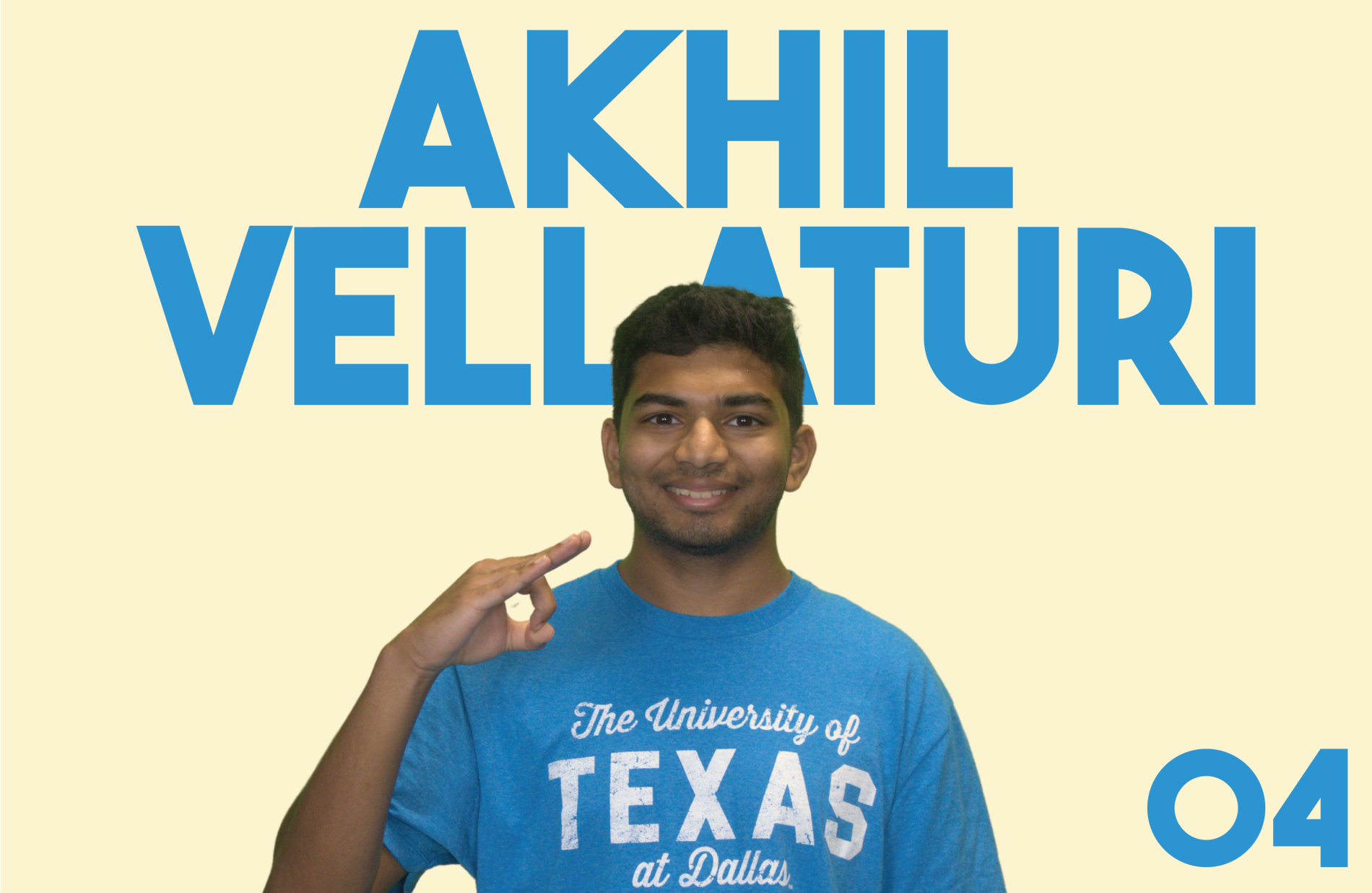
Coppell High School senior Akhil Vellaturi is ranked fourth in his class, representing a dedicated student who strongly believes in perseverance and balance being key to success. His hard work in academics, along with his involvement in the Coppell tennis program as team manager, has earned him a place among the top ranked students in his graduating class. Vellaturi will be attending the University of Texas at Dallas to pursue a career in medicine.
What does it mean to you to be in the top 10?
Being ranked in the top 10 students is truly an honor for me. It’s not just about the ranking – it represents the years of hard work and perseverance that we all put in. I consider it a validation of the effort that I’ve put into my studies and extracurricular activities throughout high school. More than that, it reflects the support I’ve received from my teachers, friends and family. Being in the top 10 motivates me to continue setting high goals for myself and to do well in my future, not just in academics but in all aspects of my life, while also being a reminder that success comes with responsibility.
What advice would you give to your underclassmen?
If I could offer advice to underclassmen, it would be to find a balance between hard work and enjoying the high school experience. While it’s important to be successful in academics, it’s equally essential to take time to enjoy your life and pursue passions outside of the classroom. High school is a time to grow and discover what you enjoy, so make the most of it by staying open-minded.
What is a high school memory that will always stay with you?
Something from high school that I’ll always cherish is the field trips where we had to go to tennis tournaments and the experiences I’ve had as the team manager. It’s not about a specific moment, but the overall experience of bonding with the teammates, competing together and creating lasting memories is special. Whether it was traveling to tournaments or team-building activities, those moments helped me have friendships that I’ll carry with me.
What is the unexpected lesson you’ve learned during your time in high school?
An unexpected lesson I’ve learned in high school is how important it is to embrace failure and that you won’t always be successful. Over time, I’ve realized that making mistakes is an inevitable part of growth and learning. There will always be someone better than you at something, but I have learned that rather than being discouraged by failure, it is better to see it as an opportunity for self improvement.
What motivates you to excel academically, even in the face of challenges?
My motivation to excel academically stems from a desire to constantly improve and challenge myself. While academic success is important to me, I try to remind myself often that achieving good grades isn’t the only thing that matters in high school; it’s about pushing myself to reach my full potential and make a positive impact. Whether it’s finding activities to further expand my passion for science or contributing to my community, I’m most driven by a sense of purpose to make a difference.
If you had the chance to redo high school, what would you change?
If I could redo high school, I would prioritize finding a balance between academics and extracurricular activities from the start. During my freshman year, I missed out on playing tennis due to various reasons, and looking back, I regret not taking advantage of that opportunity. I also wish I had been more proactive in exploring new interests and hobbies earlier on. High school is a time of growth and self discovery, so I would encourage my younger self to take advantage of every opportunity and make the most of each experience available.
What’s one misconception people have about high-achieving students like yourself?
One common misconception about high-achieving students, including the top-ranked students, is that we spend all our time studying and don’t have time for anything else. While academics are important to me, I also value maintaining a healthy balance between school, extracurricular activities and my interests. Like many of my peers, I enjoy spending time with friends, pursuing hobbies and engaging in activities outside of academics. Achieving success isn’t just about studying endlessly; it’s about finding a balance that allows for personal growth and fulfillment.
What’s your secret to success?
My secret to success lies in having resilience and willingness to continuously challenge myself. I believe in setting high goals, staying focused and putting in the effort required to achieve them. Additionally, I prioritize time management and organization, ensuring that I make the most of my time and resources. Surrounding myself with supportive friends, family and mentors has also been instrumental in my journey. Ultimately, success is a result of hard work, determination and a passion for continuous improvement.
Have you ever had to deal with imposter syndrome and what do you do to overcome self doubt?
While I haven’t experienced imposter syndrome, I have faced moments of self doubt, specifically when it comes to my abilities in tennis and academics. During times like these, I try to remind myself that it’s normal to have doubts and insecurities, but what matters is how I choose to respond to them. Instead of letting self doubt hold me back, I use it as fuel to push myself harder and strive for excellence. I focus on my strengths, seek support from others and remind myself of past accomplishments to boost my confidence and overcome any doubts.
How has your high school experience shaped your future aspirations and goals?
My high school experience has played a significant role in shaping my future aspirations and goals, particularly in the field of science and medicine. Throughout high school, I’ve had the opportunity to explore my interest in science through rigorous coursework and hands-on experiences. My passion for science has grown my desire to pursue a career in medicine. I’ve been drawn to the prospect of making a positive impact on people’s lives through healthcare, and my high school experiences have solidified my commitment to this path. Whether it’s conducting research, volunteering in healthcare settings or participating in extracurricular activities, each aspect of my high school journey has contributed to my growth, shaping my aspirations for the future as I will be attending the University of Texas at Dallas.
Who is someone, a teacher or mentor, who you’d like to thank for their impact on your academic journey?
One person who has had a profound impact on my academic journey is my older sister Shruti Vellaturi, as she graduated from Coppell High School in 2018. She not only served as a role model for me but also provided invaluable support and guidance throughout these four years. As a former student of the same school, she shared her experiences, offered advice and motivated me to strive for excellence in academics and beyond. Her encouragement and belief in my abilities have been instrumental in shaping my academic and personal growth. I am very grateful to her for her mentorship and for always pushing me to be the best version of myself.
Story by Rhea Choudhary
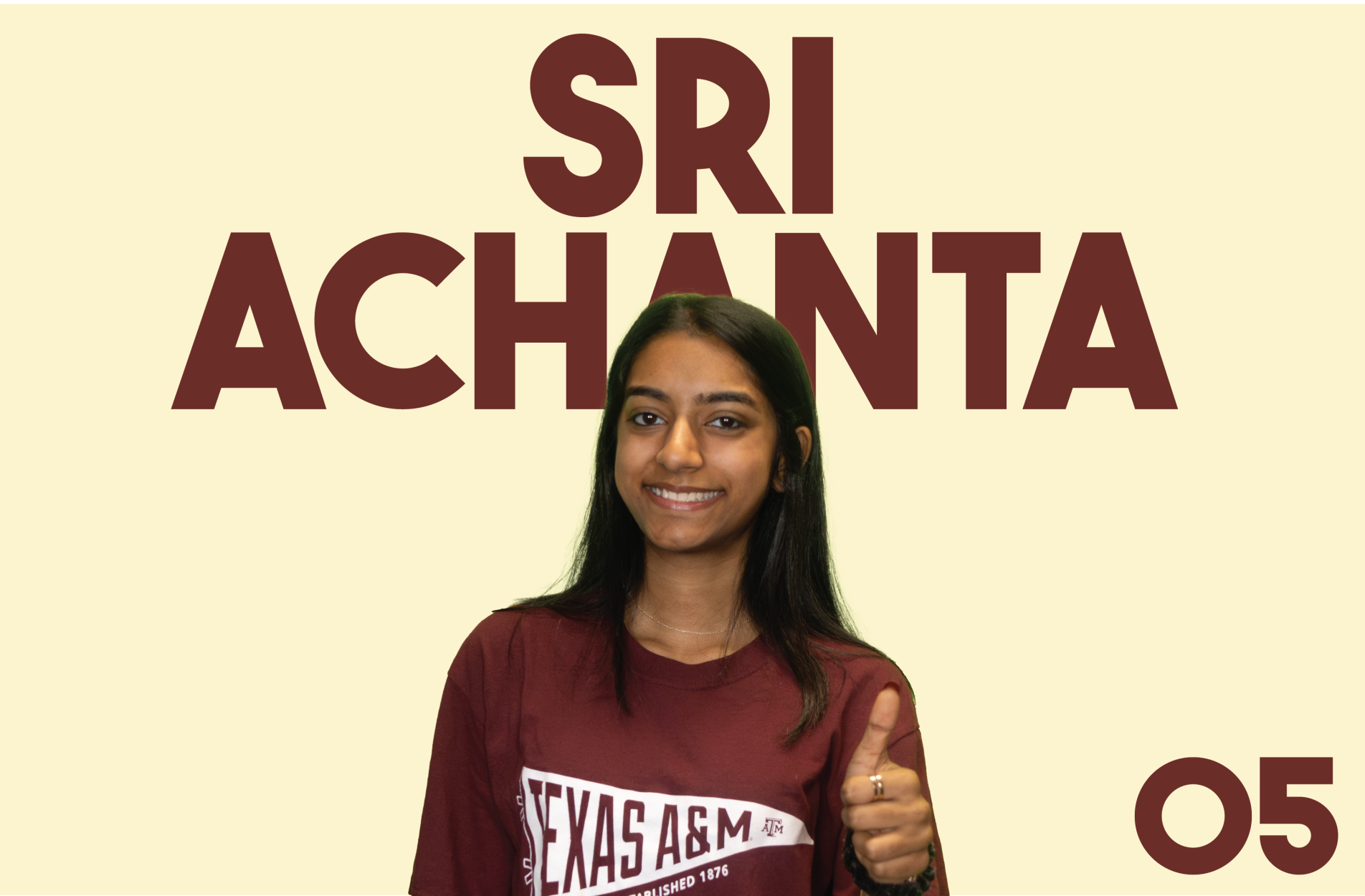
Meet Coppell High School senior Sri Achanta whose journey through academics has meant more than grades and rankings. Ranked No. 5 in her class, Achanta is a well-rounded student, as editor-in-chief of The Sidekick, Coppell DECA member and research intern at the University of Texas Southwestern Medical Center. Achanta will attend Texas A&M University as a student in the E2EnMed early assurance program, and she shares her insights on navigating high school with wisdom beyond her years, offering valuable advice to underclassmen and reflecting on the experiences that have shaped her perspective. From sharing significant lessons she has learned leading to shaping her future aspirations, Achanta’s honesty and authenticity are displayed through her secrets to success and the impact this journey has had on her.
What does it mean to you to be in the top 10?
Being ranked in the top 10 is a testament to the work I’ve put in as a high schooler, but I’m more proud of other things I’ve accomplished. This includes being a part of The Sidekick as the executive editor-in-chief: I’m part of a family that I know cares for me and that I also care for. I’ve had great opportunities through this program because of the relationships I’ve built after working with different people – that means a lot more to me than the number rank I am.
What advice would you give to your underclassmen?
If you are striving to achieve a high rank or any academic accomplishment, take classes that you’re interested in and focus on those classes so that you don’t overpack your schedule. I never took too many AP classes, I took a course load that I knew was manageable for me. I did well in those classes because I was interested in them. I would also advise underclassmen to take classes aside from academics that they may enjoy. Whether that be theater, band, art, choir or anything else, take classes that will teach you skills that are important in life, such as social and emotional skills.
What is a high school memory that will always stay with you?
I don’t have a specific memory but meeting my friends in sophomore year will always be special to me. In freshman year, our grade was virtually learning due to the COVID-19 pandemic so I went to high school in person for the first time in 10th grade. I immediately clicked with some people who are currently my best friends and it’s just amazing to always be with them. They’re great people who are always there to support me. What’s really interesting about my friends is that most of our siblings are also friends, which we didn’t realize until after we met. All those experiences I’ve had with them are lovely because they are the reason why I’m here today.
What is the unexpected lesson you’ve learned during your time in high school?
An unexpected lesson I learned is that you learn a lot from the people you interact with. Surround yourself with the right people and force yourself to talk to all different types of people. For me, that came through The Sidekick because I was able to talk to different individuals who each have different interests, and I have been able to learn so much from them. What matters is your experiences with these people and how you can learn through just speaking to them. You need to communicate with individuals, learn their stories and understand their perspectives because that’s going to shift how you treat them and how you view your perspective on life.
What motivates you to excel academically, even in the face of challenges?
What motivates me to excel academically is just looking at the future. I know what I want to be in the future and I know that to be able to do what I want to do, I need to have a vast amount of knowledge. Knowledge comes from learning, which is what we do in school, and is also somewhat correlated to the grades we get. Also, the innate curiosity that I have about certain topics just motivates me to continue to learn more because I know that I’ll be applying that in the future for better use.
If you had the chance to redo high school, what would you change?
Honestly, I’d take more classes and be a part of more organizations in the fine arts. Previously, I didn’t know that you could audition for the high school musical even if you weren’t in theater, so I think that’s something that would have been really cool that I wish I would have done.
What’s one misconception people have about high-achieving students like yourself?
I hear this a lot: other students think we are high achieving in every subject possible but that isn’t right. The only reason we are here today is because we did well in the classes we took and that doesn’t apply everywhere. For instance, just because I’m ranked five doesn’t mean I have any knowledge about a class like organic chemistry. What we know is limited to what we have taken and while it may expand out of that, it’s nothing more than what your average high school student knows. All we did was excel in the classes that we took, so being ranked doesn’t mean you have an extensive amount of knowledge in each and every subject.
What’s your secret to success?
My secret to success is always having something to look forward to. For me, that has always been having at least one class that I know I’m super excited about going to, and most of the time going to The Sidekick is that outlet. I always try to have something that I’m happy about. I make sure I don’t compare myself excessively to the people in Coppell who do great but extreme things because comparison will always drag you down. I look for the positive things in my life that motivate me to continue to pursue whatever I am motivated to do at that moment.
Have you ever had to deal with imposter syndrome and what do you do to overcome self-doubt?
Yes, I have dealt with imposter syndrome because Coppell usually associates the top 10 people with a certain amount of academic inclination. But, being ranked doesn’t mean that you’re knowledgeable in all subjects – it just means that you’ve excelled in certain classes that you’ve taken, like I’ve said before. You’ll see kids all around you who are doing incredible things and are super knowledgeable in class that you haven’t taken and you may feel like you don’t deserve to be where you’re at because you’re not as knowledgeable as they are. That’s something I’ve dealt with. Yet, one thing I’ve realized is that I am who I am and I know as much as I know because I’ve learned what I want to know.
To get over imposter syndrome, the first thing I realized was that I couldn’t compare myself to the people around me because we all have different perspectives. Everyone grew up in different ways and took different classes which is OK because they aren’t going to do the same thing that I’m going to do in the future.
How has your high school experience shaped your future aspirations and goals?
I am committed to Texas A&M University and I will be pursuing the E2EnMed early assurance program where I receive an undergraduate degree in engineering and then study in the medical school down in Houston. My future is this combination of technology and medicine because they go hand in hand which I think is really interesting; I’ve realized that I wanted to pursue that because of the things I’ve done in high school. In high school, I had the opportunity to shadow a prosthetist and work on research at UT Southwestern. Those technical skills of science and engineering were things I wanted to pursue, even though I didn’t take any engineering classes or a lot of science classes at school. Going into the medical field with a combination of science and math knowledge is beneficial to me, shaping my future to become a “physicianeer” through this program.
Who is someone, a teacher or mentor, who you’d like to thank for their impact on your academic journey?
I’d definitely like to thank all of my teachers who have brought me to where I am today, but I would like to shout out a couple of my teachers. I’d like to thank Coppell High School social studies teacher Shawn Hudson and math teacher Ian Vanderschee because they have been instrumental to my growth. Mr. Hudson has taught me so much about what it’s like to be a high schooler, especially when I had him in my sophomore year. I always go into Mr. Vanderschee’s room every other day just to talk to him or bug him for a recommendation, so thank you to both of them. I also wanted to thank my favorite trio which includes Sidekick adviser Chase Wofford, business teacher Richard Chamberlain and pathophysiology teacher Ray Pool who have all continually supported me with their Aggie mentality, even though only Mr. Chamberlain went to Texas A&M. They are always there for me, making me laugh and have been supportive of everything I’ve done, especially since they were the first three teachers I told about my college decision. They’re so funny and no words can describe how much I appreciate them for their constant support.
Story by Rhea Choudhary
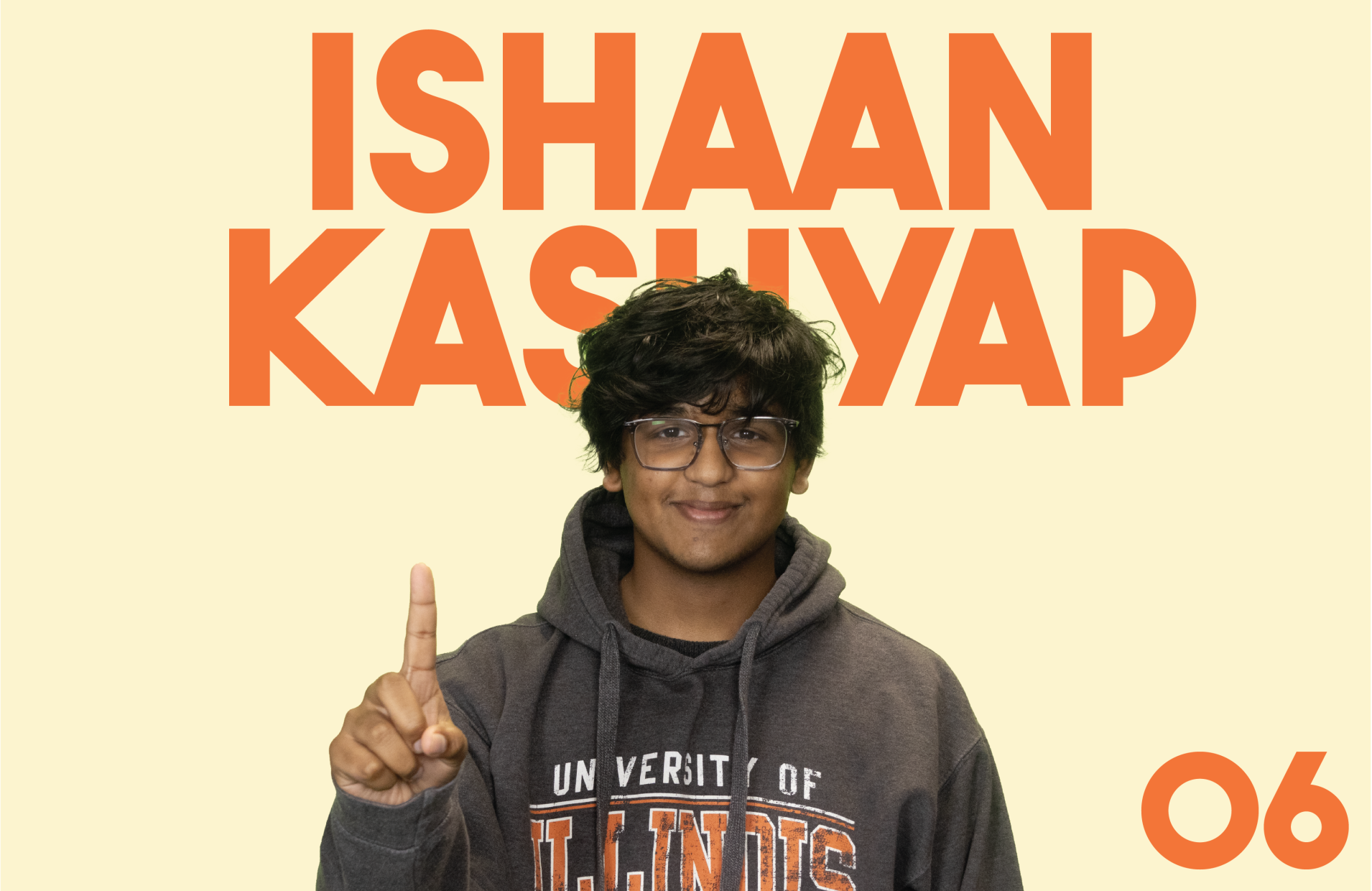
Ranked sixth in his class, Coppell High School senior Ishaan Kashyap is a shining example of the balance of a healthy social life and academic productivity. Within programs such as Academic Decathlon, he was able to rise to stay upon the top ranks of his class. Kashyap plans to attend University of Illinois at Urbana-Champaign to pursue environmental engineering.
What does it mean to you to be in the top 10?
Working hard in class and putting in the hours on things like homework and studying really paid off. I think the combination of being disciplined and dedicated helped me the most.
What advice would you give to your underclassmen?
I would tell them not to stress too much about their grades because it is really not that big of a deal whether you are in the top 10 or top 6%. Just do things outside of school rather than focusing on maximizing grades. There’s a lot to do in the community with different people across the country and state, so focus your attention trying to cultivate those types of skills rather than focusing on grades in classes that you probably won’t use in college or later in life.
What’s a high school memory that will always stay with you?
Seeing all my friends and doing things like going out to get food is what I’ll probably remember most. In April, we went on a trip to Oklahoma and hung out. We went hiking, kayaking and just spent time in nature.
What is the most unexpected lesson that you’ve learned during your time in high school?
Grades really are not what you’re here for. So you don’t really have to worry about school. Of course you want to graduate and everything, but it’s more about what you do outside of school with your free time and what you can do, rather than just the in-school activities.
What motivates you to excel academically even in the face of challenge?
I think it’s just goals I set for myself rather than an external motivation. I just want to be able to say I did my best because of the standards I set for myself.
If you had the chance to redo high school, what would you change?
I would take more electives and fun classes, and less AP and IB classes. Specifically, I think I would take Guitar I, because it looks really fun.
What’s one misconception people have about high achieving students, like yourself?
Most people think we study all the time, but that is not true. Studying is boring and I’m really proud to admit that.
What’s your secret to success?
It is mostly just paying attention in class. I feel like if you pay attention in class, you don’t need to spend that much time outside of school to study and catch up on assignments.
Have you ever had to deal with imposter syndrome, and what do you do to overcome self doubt?
There’s definitely a lot of amazing people here, so you need to just zone them out and focus on what you want to do, and make sure you’re working towards your own goals because it does not matter what everyone else is doing. It is all about how you are planning to achieve what you want to achieve.
How has your high school experience shaped your future aspirations?
To be honest, it has not. I don’t really know what I want to do yet. I feel like I should have explored more in high school, but I think I still have a solid foundation in terms of basic skills to which I can explore more in college.
Who is someone, a teacher or mentor, who you’d like to thank for their impact on your academic journey?
I think AP World History/Academic Decathlon teacher Tim Dixon was pretty monumental because he’s our Academic Decathlon coach. I appreciate that he’s very hands off, and he lets us lead ourselves, decide how hard we want to go and how much we want to dedicate to achieving our goals.
Story by Anvita Bondada
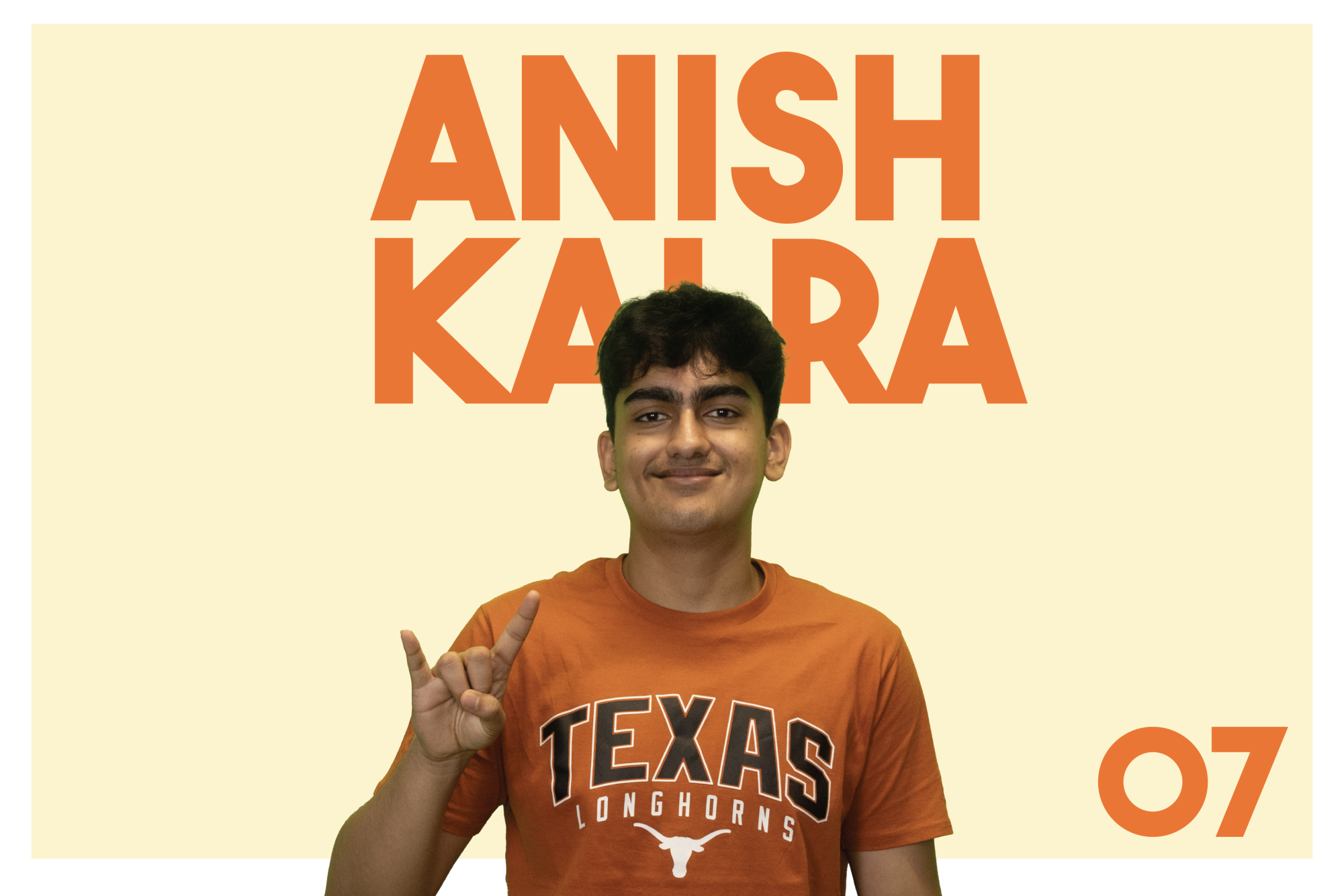
Ranked seventh in his class, Coppell High School senior Anish Kalra portrays excellence in every aspect of both his academic and social life. His balance between theater, extracurriculars and computer science has allowed him to be successful. Kalra will attend University of Texas at Austin to study computer science.
What does it mean to you to be in the top 10?
I think especially in today’s media and just the way college admissions is approached, you see online that your class rank doesn’t really matter or is just a skewed metric. There is some truth to that, but to me, class rank is just a demonstration of continued effort and deliberate intent over four years. It’s not like an SAT where you take it once or twice, and it’s not a competition where you prepare for a few months. It is a four-year journey and a four-year testament to your consistency. Oftentimes you have very little control, you don’t know what teacher you’re going to get, you don’t know what class you’re going to be in, and you don’t know what class period you’re gonna have. Those are all factors that ultimately play into your grade in the class. I personally think that the class rank is just a testament to one’s resilience to consistency and just overall mental adversity.
What advice would you give to your underclassmen?
I think a lot of people end up trying to fit certain molds, trying to fit certain expectations, and they do that in sight of college admissions and I don’t want to get too philosophical, but I think that’s a pretty big issue where kids try to fit a certain mold. They try to fit these archetypes where they feel like that’s going to help them get into college, but that’s not something I tried to do. The biggest piece of advice you can give someone is to truly follow their passion and that’s something you’re going to hear from everyone. Everyone’s going to say to follow your heart, but I think that is the best piece of advice you can ever get. If you truly follow your heart, if you truly follow your passion and what you believe in, you’re going to excel in that. If you try to fit a mold for something you don’t necessarily enjoy as much, you’re never going to excel to that degree. It’s like telling a shark to walk on land, but that’s not possible. It’s like telling the cheetah you’re the fastest animal on land and to now go swim in water. To me high school should be about truly following your passion and about trying to excel in the things you like, not the things you feel like you have to like.
What is a high school memory that will always stay with you?
I’m sure you’ve heard of the quote, ‘It’s not about the destination, it’s about the journey,’ but to me it’s also about the company, and the people you have around you. My best memories of high school are so many different memories I have with so many different friends across various domains, whether that was the science fair or in theater. So my favorite memory of high school will just be the quality time I had with my friends.
What is the most unexpected lesson you’ve learned during your time in high school?
I’d say it’s that your conditions you have before you enter high school and before you even enter middle school are a part of who you are, and those are things that you should embrace rather than try to neglect. What that means is that everybody has certain baggage to them, emotional baggage or physical baggage in the form of family, friends, or whatever else, and those are the things that contribute to our individuality. I know I do theater and I am majoring in computer science, and those are two diametrically opposing fields and sometimes I would feel like I have to kind of tone down my personality when I’m dealing with other computer science students or I have restrict the energy I bring to a team, but I think that’s the opposite of what you should do, take your past and your identity with pride.
What motivates you to excel academically, even in the face of challenges?
I think for me personally there’s just an innate desire. Excelling academically was never a pressure that was put on by my parents. I know at least in the Asian community that’s a big stereotype of ‘Oh you only study because your parents force you to,’ but my parents are very chill, they don’t care. My desire just came innately. I’m a very competitive person in general and that’s just my personality because I used to play a lot of sports so it’s just an innate desire.
If you had the chance to redo high school, what would you change?
I’d be more open to exploring more, especially because our freshman year was COVID-19 year and so a lot of our opportunities were restricted. I would like to be more open to just say yes to more things, because you never know what a new path that can lead to you.
What’s one misconception people have about high achieving students like yourself?
I think a lot of people think that students in the top 10 study constantly, and don’t have a life outside of school or they’re cheaters. I know cheating is a big thing that’s talked about at our school, but a lot of my friends that are in the top 10, though there’s always a few exceptions to the case, most of us are good human beings with actual personalities. I’m in theater. I know one person is in The Sidekick and one’s in a band so everybody has a personality to them. No one is just a singular nerd who sits at their desk all day, and I think we all explore multiple pathways. So I think that a misconception people have about high-achieving students is that they don’t have a life beyond the classroom, but I don’t think that’s true.
What’s your secret to success?
It’s all mindset, It’s all about mind over matter. I’ve been told a few times in my life that I come off as arrogant to other people, but I think the reason is because I believe in myself a lot and that can be perceived negatively by people for sure. But if you don’t believe in yourself, who will? For me, it’s always boiled down to mind over matter and an innate belief in who you are and your capabilities.
Have you ever had to deal with imposter syndrome and what do you do to overcome self-doubt?
I never dealt with imposter syndrome, and I think it’s all about just focusing on your journey. It just ties back to the things I mentioned earlier about focusing on your journey and your baggage. There’s no competition in terms of imposter syndrome, and I felt self-doubt for sure especially, trying to pursue two completely different pathways. Ultimately, the way you overcome self-doubt in my opinion is by reading about successful people. Reading about successful peoples’ journeys and what they went through kind of always motivated me, and helped me find my footing once again. All of those people kind of had that one singular concept, they believed in their idea and their concept. The founder of Nike, Phil Knight, I read his memoir and his first shoe company was a disaster. He was broke already, but he was resilient and he went on from there. So I think when it comes to self-doubt, you just kind of have to pep talk yourself and try to gaslight yourself out of the situation, find positive footing and keep going from there. I think people who are positive will ultimately be successful. You shouldn’t be a Debbie downer since a negative mindset can actually hinder you quite a bit.
How has your high school experience shaped your future aspirations and goals?
I know high school has definitely helped me career-wise, and helped me figure out what I want to do. I came into high school and was very confused. As I mentioned earlier, if you explore multiple pathways, you’re kind of refining what you end up wanting to do in your life. I think high school really taught me how to be a good person, and that might seem like a silly answer or a cliche answer, but I truly think that my moral values and who I am as a person have become much more resolute and strong because of my high school experiences. I not only know what I want to do in the future, career-wise, but I also have a strong ethic in mind as I’m conducting myself in the future. I’ve also just become a lot better at talking to people, at interacting and just being a sociable person.
Who is someone, a teacher or mentor, who you would like to thank for their impact on your academic journey?
I’m going to thank my parents, those are my two biggest supporters in life. Without their guidance, support and courage, I don’t think I’d be where I am today. So a huge, huge shout out to my parents, I love them so much. Second I would say is IB Mathematics/AP Calculus BC teacher, Mr. VanderSchee. I had him sophomore year, and even though I only had him in sophomore year, in junior year and senior year, he was a continuous mentor to me. I’d stop by his class every day. Mr. VanderSchee was someone who also actually really helped me develop a more character side of life. He’s a huge proponent of being positive and he’s a more carefree person who ultimately believes you will achieve what you desire in the end if you are determined for it. He’s a very encouraging and calm person, and the demeanor that he brought was something that really impacted me.
Story by Greeshma Marathu
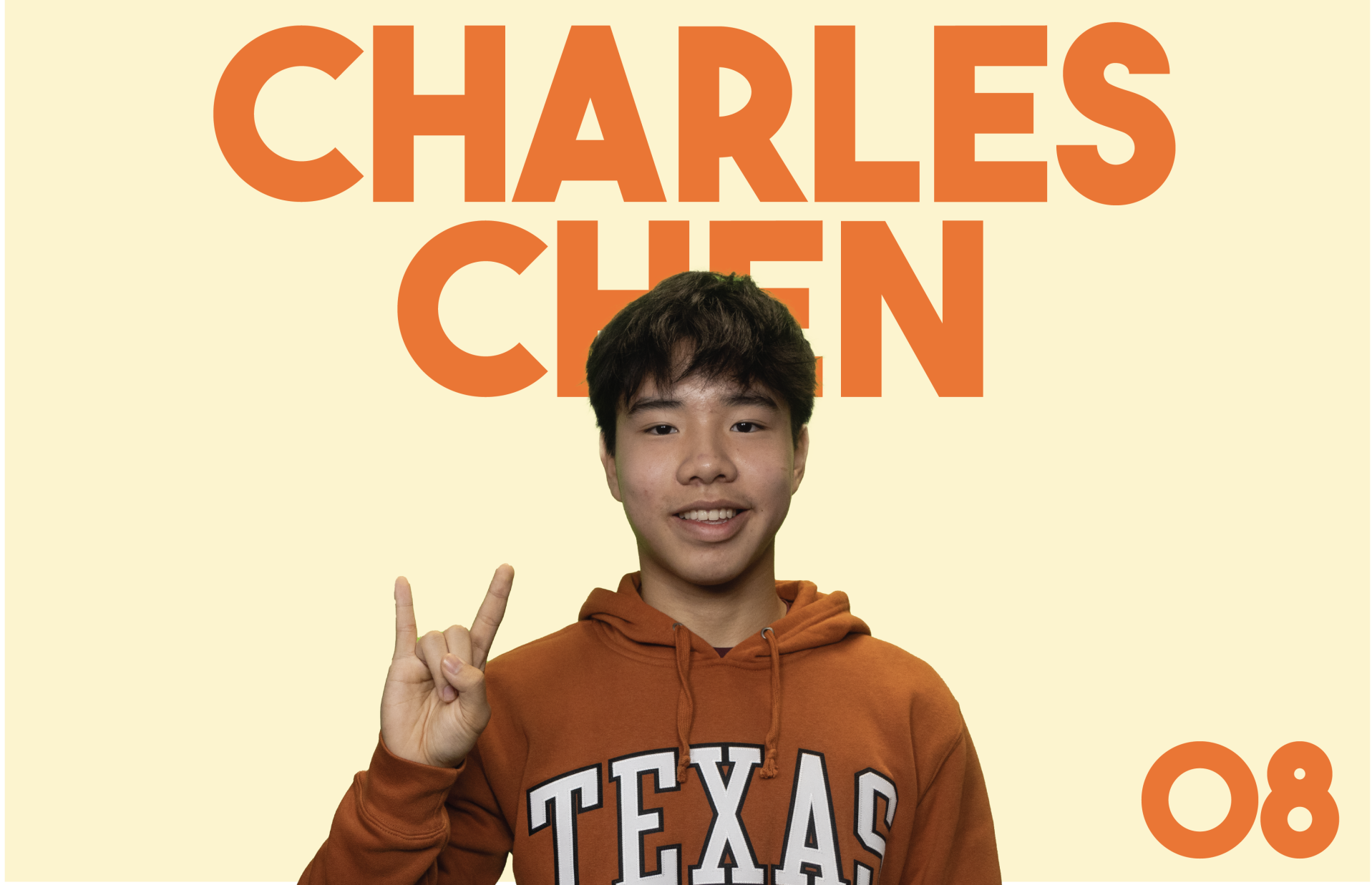
Ranked eighth in his class, Coppell High School senior Charles Chen embodies what it means to have a plethora of accolades white maintaining the right state of mind. Through interacting with people at CHS and its organizations, such as Science Olympiad and Technology Student Association, Chen has created bonds that will last him a lifetime, and developed a work ethic that brought all the way to the University of Texas at Austin, where he plans to study Engineering.
What does it mean to you to be in the top 10?
I guess it means my hard work has paid off, and studying while my friends were hanging out paid off. Of course it’s not always like that, but I guess being able to see that work pay off is really important to me.
What advice would you give to your underclassmen?
Have some fun and remember that rank is not everything. Grades are important, but it is not going to get you that far. I would say the social experience is more important than the academics.
What is the most unexpected lesson that you’ve learned during your time in high school?
Everyone has their own strengths, so it is easy to underestimate other people. But everyone is smart in some way and nobody just does nothing in their spare time. I learned that you can find some sort of skill in everyone and you can bond with other people through those skills.
What motivates you to excel academically even in the face of challenge?
I think it’s just like an internal thing. I don’t have anyone forcing me to do it, so that motivates me in a way. There’s no other explanation for it, it’s just my own drive.
If you had the chance to redo high school, what would you change?
I wouldn’t change anything. I spent a lot of time with friends and bonding with teachers. I think I did a lot of that, so those are some good memories. Studying wise, I did a good bit, but I do not really regret doing or not doing anything because I don’t think I missed out.
What’s one misconception people have about high achieving students, like yourself?
We are not studying all the time. That’s pretty much it. I don’t study all day like people think.
What’s your secret to success?
I think keeping good mental health and physical health is important because success is a by-product of a healthy body and mind. So, if you have a healthy mind, then you have the drive to do homework and study for tests. And if you’re in a healthy body, then you can obviously do all the things that require physical activity, like schoolwork.
Have you ever had to deal with imposter syndrome, and what do you do to overcome self doubt?
I wouldn’t say I had imposter syndrome, but I guess I was just a little bit shocked when I found out I was in the top 10, but I wouldn’t say I have imposter syndrome. You’re there for a reason, none of this is luck. If you’re ranked highly, then be proud of yourself.
How has your high school experience shaped your future aspirations?
I think in high school, I became a lot more social especially since I used to be a shy kid. So I think in the future, I want to have a more collaborative job. So I think engineering is a good place for that. I think I learned a lot of social skills and I want to apply them in real life.
Who is someone, a teacher or mentor, who you’d like to thank for their impact on your academic journey?
I would say Dr. Johnson, my AP Statistics teacher because of this one time when he pulled me out of class and told me how impressed he was of me. I never had that kind of compliment, so he really gave me the drive to do better and continue what I’m doing. He has had a really big impact on me.
Story by Anvita Bondada
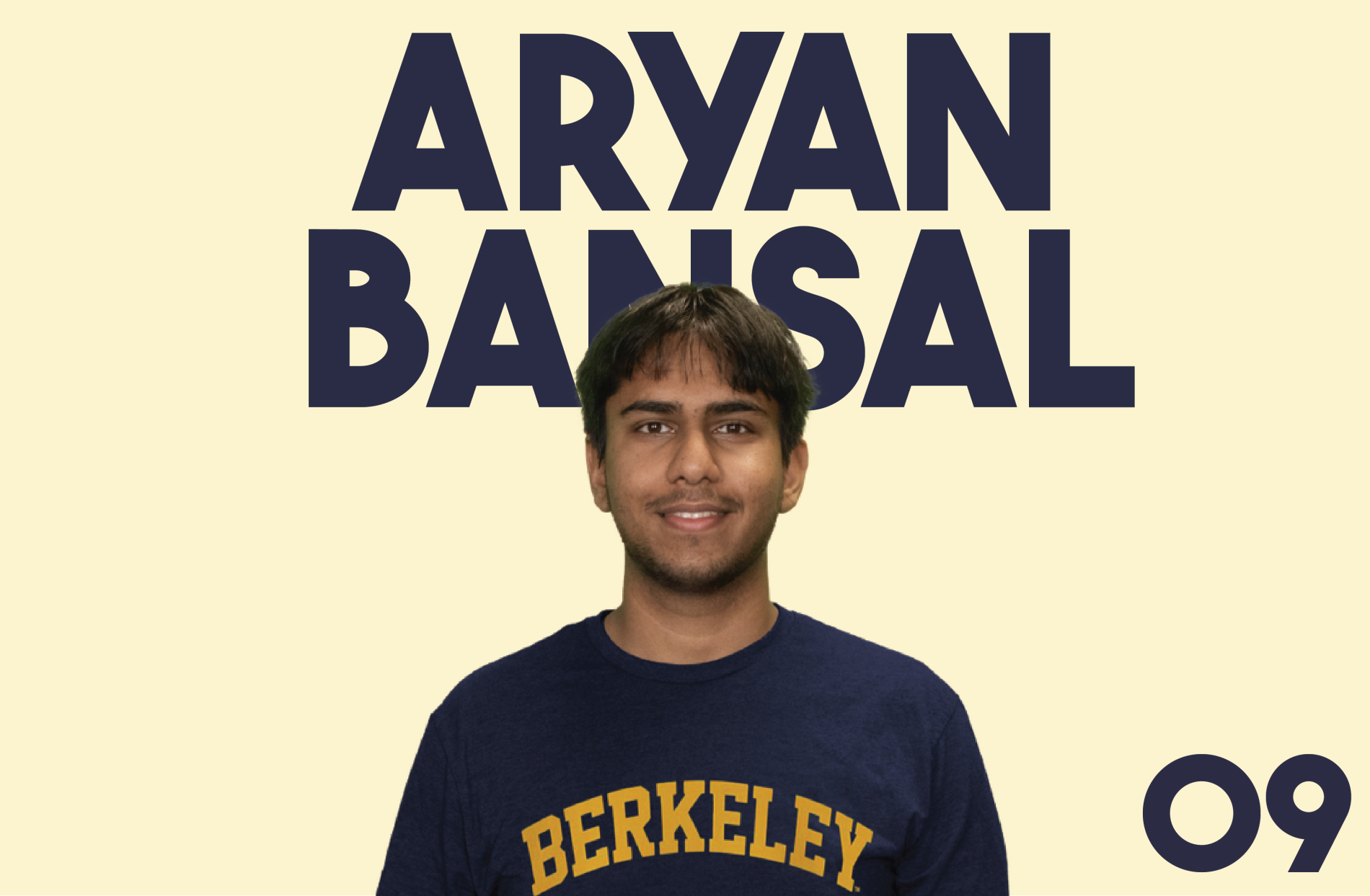
Coppell High School senior Aryan Bansal could not only tell you everything about coding and physics, but also how to manage time through high school to achieve numerous accolades while still keeping a healthy mindset. Bansal’s pursuits led him all the way to University of California, Berkeley to major in Electrical Engineering and Computer Sciences and Business where he aims to become an engineer one day.
What does it mean to you to be in the top 10?
I would say that it shows if you have been working towards something, it affirms your efforts in a way. At the same time, the biggest thing I have learned is how to learn well. Rather than just grades, being in the Top 10 shows understanding of how to be a good student. That’s what I consider an indication that I am able to learn a given topic.
What advice would you give to your underclassmen?
If you are trying to be academically successful, one of the biggest things that I think most people would agree on is organization. That starts with just not procrastinating when you have an assignment and prioritizing things which are more important over others. At the same time, it is not one of those things where you should suffer in other parts of your life. Also, even if you have other goals, it does not have to be the one thing that you are working towards. If you want to do something, it is something that you can do in accordance with other things.
What’s a high school memory that will always stay with you?
It was last year at TSA [Technology Student Association] for me. In our state competition we had been working for a software development company, and our team ended up getting first place. For us, it was kind of unexpected, so I think when we realized we got first place, it was a pretty exciting moment.
What is the most unexpected lesson that you’ve learned during your time in high school?
In general, something to keep in mind is to not overthink things. Whether that would be an assignment or anything, I would say that it is best to see how you can improve rather than dwelling on one thing for a long period of time. It is best to take your failures and use them as something positive, understanding how you can improve from them.
What motivates you to excel academically even in the face of challenge?
I would say that in the beginning, I was like “I want to get good grades so I can get into college.” Over the years, it feels like my own interest helped me. I feel like how it worked was that there was a focus on getting grades at first, but once I realized how to do well, it translated to learning, getting to know my teachers and being an attentive student, as well as knowing how to learn content and ask questions.
If you had the chance to redo high school, what would you change?
I’d be more consistent. Instead of trying to do everything at once, I would be more consistent in my schoolwork. If I was trying to even just get good grades, being more consistent and organized would have helped, rather than following just some random plan. I would have gotten better results, and also avoid some of the unnecessary stresses that are attached with that.
What’s one misconception people have about high achieving students, like yourself?
Some people think that all we do is study and work towards getting grades up. In reality, I would say for most people I know, that is not even true. High achievement is a byproduct of just understanding balance.
What’s your secret to success?
If you are thinking of joining a club or applying for a certain leadership position, just go for it. Even if it does not work out, you will learn a lot so if you want to try something similar, you could have success. And oftentimes, you’ll find that if you really are dedicated to doing something like that, something will work out. That’s often just how it happens – you could say that the universe works to make something happen. So I’d say if you have a goal, you want to think about it just go for it rather than overthinking.
Have you ever had to deal with imposter syndrome, and what do you do to overcome self doubt?
I wouldn’t necessarily say I would have impostor syndrome. I feel like for anyone that would, I would say that they should kind of think back on all of the work they put in, and I am sure that they will find that they really have a reason for where they are. The best thing to do is reflect on all the work you put in, and you will find that you do deserve to be wherever you are.
How has your high school experience shaped your future aspirations?
In terms of shaping my future, it is the type of mentality I have gained. If you’re trying to solve a problem, I have learned that just going out of your way, and making something work will pay off. I have learned that if I dedicate my time to something, while not doubting what the repercussions might be, it will gain good results.
Who is someone, a teacher or mentor, who you’d like to thank for their impact on your academic journey?
One of the activities that I ended up doing in high school was volunteering at Greater Dallas Arya Samaj Cancer Clinic, and the director, Vijay Bhala, has really influenced me. The reason I picked this person is that not only was he really encouraging, even when I made a mistake, but if I had an idea, rather than casting us away because of our age and inexperience, he was more than willing to advocate for my ideas. He ended up guiding some of the things I ended up achieving. He was a guide in helping me understand and have confidence in going after certain things.
Story by Anvita Bondada
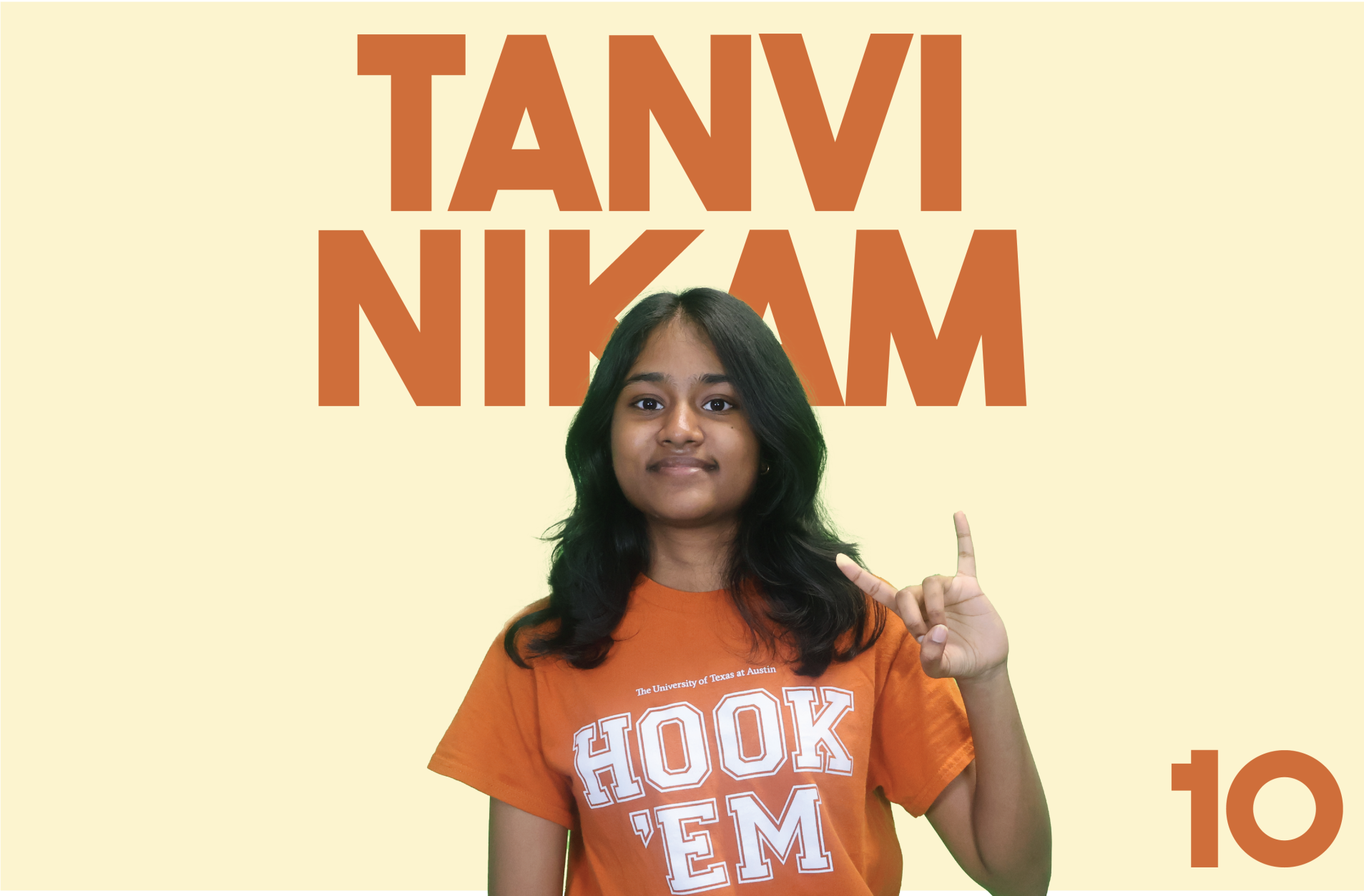
Coppell High School senior Tanvi Nikam is ranked 10th in her class, exhibiting her ability to balance between her academics and her extracurricular activities. Her consistency with being a leader as Eco Club co-president and Technology Student Association secretary allows her to thrive. Nikam will attend University of Texas at Austin to pursue electrical and computer engineering.
What does it mean for you to be in the top 10?
Being in the top 10 means a lot to me. I’ve been trying really hard to maintain my grades throughout high school and I feel like this rank really showcases the work and effort I put in throughout my high school years.
What advice would you give to your underclassmen?
My advice would be to have a strong start from the very beginning, even though in ninth grade it may seem far until ranks come out. Starting strong from then gives a good foundation, so you can be more relaxed later on.
What is a high school memory that will always stay with you?
My first football game was memorable. It was only in senior year because I was always too busy to go in junior year, but I realized how much fun school events can be. It was a great time to hang out with my friends and I got to show some school spirit once in a while.
What is the most unexpected lesson you’ve learned during your time in high school the most?
Well, I always used to think that I would get my most satisfaction from having good grades, but I realized throughout high school that I actually am more proud of myself for my extracurricular activities, such as the Technology Student Association and Eco Club, and that makes the high school experience much more worth it than just having good grades in school.
What motivates you to excel academically, even in the face of challenges?
I think my biggest motivator is my twin sister, Tanya Nikam, because even on days when I’m super stressed out and I want to quit, I see her also working. We encourage each other both to do more and push ourselves further, and without her I would not be where I am today.
If you had a chance to redo high school, what would you change?
I would be more willing to try new things and participate more in school events than I did before. I used to think that those were only for a special group of people, but now I realize that anyone can be part of the school events. There’s some stuff in high school you don’t want to miss out.
What is one misconception people have about high achieving students like yourself?
I think one conception is that the personality that we have is very studious and academic-focused. I don’t think any of my friends would realize that I am a high-achieving student, because I like to play games in class and have fun all the time. There’s not one mold for these kinds of students. We just happen to also have good grades, and we’re so much more than our grades.
What is your secret to success?
I feel like what sets me apart is that even on nights when I don’t want to do anything, and when I have three tests the next day, I still work hard that night and stay up until 3 a.m. Those are the special days that took me to the next level because I know if I had skipped out on even that one night, my grades would have been affected. I think it’s just the consistency and no matter how I’m feeling that day, no matter what situations are, I still have to do my best in all my classes.
Have you ever had to deal with imposter syndrome?
I learned over high school to not let people know much about my grades, because the moment they saw me as someone who had good grades, they would just classify me as, ‘oh, that smart kid’. But I know in high school, I don’t want to be remembered by my grades or by my smartness, I’d rather be known for my personality. I definitely in the very beginning did feel a little bit of imposter syndrome, but I also surrounded myself with better people throughout the years, and they made me feel welcome no matter what.
How has your high school experience shaped your future aspirations and goals?
I think high school has been a really strong foundation in setting up my dreams and goals entering high school. I had zero idea of what I wanted to be. I was actually in business at first, but this journey has really helped me define exactly what my goals are within engineering and within the environment, and I have a clearly defined idea for my future, which is to go into further education and research. I want to do more research into sustainable energy and help develop more efficient methods of clean production, so we can shift the earth back to a more sustainable track.
Who is someone, a teacher or mentor, who you would like to thank for their impact on your academic journey?
I would thank my parents, because they never put pressure on me from their end, so everything that I did in high school was self-motivated. I think that the reason why I was able to achieve more is because I did it for myself and not for others. I feel if they had been more demanding of me, I would have felt that pressure, not for myself but from them, and would have shied away from doing what I’ve done, and they’ve been on the sidelines but they’ve also been encouraging me throughout.
Story by Greeshma Marathu



